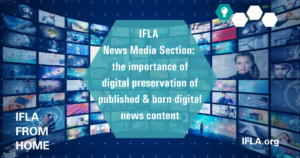IFLA News Media Section + IFLA Strategy: Information, preservation, education
23 November 2022
Coming after Media and Information Literacy week in late October and the Memory of the World celebration in early November, we highlight the News Media Section as part of this month’s Units + Strategy coverage. News Media has a lot on offer for 2022-2023, so read on to find out more about what this IFLA Professional Section has planned.

1.4 Shape public opinion and debate around open access and library values, including intellectual freedom and human rights
Social media content related to the pandemic is a living, organic whole that documents this watershed moment in time. In order to promote the skills necessary to preserve this digital history, the News Media Section has collaborated with the Universidad Nacional Autónoma de México (UNAM), Webrecorder, and Red Iberoamericana de Preservación Digital de Archivos Sonoros y Audiovisuales (RIPDASA) holdling a webinar on 10-11 November 2022 entitled, “Introduction to Digital Preservation of Content Published on Web Portals and Social Networks.” This virtual event focused on processes, methodologies, and responsibilities for capturing such information, with the goal of understanding worldwide digital preservation initiatives for capturing and preserving social media content related to the pandemic.
This webinar was primarily in Spanish to support the strong interest in this topic among Latin American scholars and allow them to share their social media preservation efforts with their international peers. Born-digital content is always at risk of being lost. This event grew out of the News Media Section’s 2020 March Midterm meeting held in Mexico City, and it represents a new research project on social media.
2.3 Develop standards, guidelines, and other materials that foster best professional practice
Following on from above, the News Media section has identified born-digital news preservation education as a significant area of need for the library field to lead. Throughout history, news content has often been a low priority for preservation, since we all know that it will be out of date the very next day! In today’s online environment, and the economic hardships faced by the traditional news media in many countries, many news outlets do not have the financial resources to invest to make sure that their digital content will survive for use by scholars in the future. To this end, the Section is developing an Online Resource Centre for Preservation of Born-Digital News Content, which provides standards and best practices for news organisations, librarians, and scholars on ways to best preserve content that was created digitally. The Resource Centre is expected to be available online in early 2023.
With news content rapidly being posted and changed, born-digital preservation of this content is a fast-growing area of need across the world. The News Media section will benefit from creating and hosting a document library related to best practices in born-digital preservation and practices, with long-term maintenance. This document library will support filling this need.
3.4 Provide targeted learning and professional development
The News Media section members foresee news literacy education as a new social function of libraries, necessitating the compilation of quality resources related to this area. A document library of curriculum materials, research, and initiatives related to this topic is also being created. This activity will build a content and curriculum library to support education in news literacy, which enables long-term support for news literacy education and news literacy initiatives within the News Media section.
Drawn from the original CFP for the WLIC 2020 News Media Section, the section held a News in Education & Research session for the WLIC 2022 for in-person discussions. From 2020-2021, this was also covered in a virtual lecture series about Fake News & News Literacy Education.
These events provided an opportunity for librarians to share ways that news media resources can be used in research and teaching. For the WLIC 2022 session, the News Media section received proposals that advanced understanding of how libraries worldwide utilise news in education and research. This assisted the section with increasing its conference paper library on this topic.
Keep up-to-date with the work of the News Media Section by reading their blog, following them on twitter, Facebook and LinkedIn, and subscribing to their YouTube Channel.